Relationship between Sociology and Tourism: Effects on Society and Tourist Behavior
VerifiedAdded on 2023/06/05
|8
|2481
|86
AI Summary
This essay explores the relationship between sociology and tourism, discussing the effects of tourism on society and tourist behavior. It covers topics such as stakeholder management, PESTLE analysis, and tourist motivation.
Contribute Materials
Your contribution can guide someone’s learning journey. Share your
documents today.
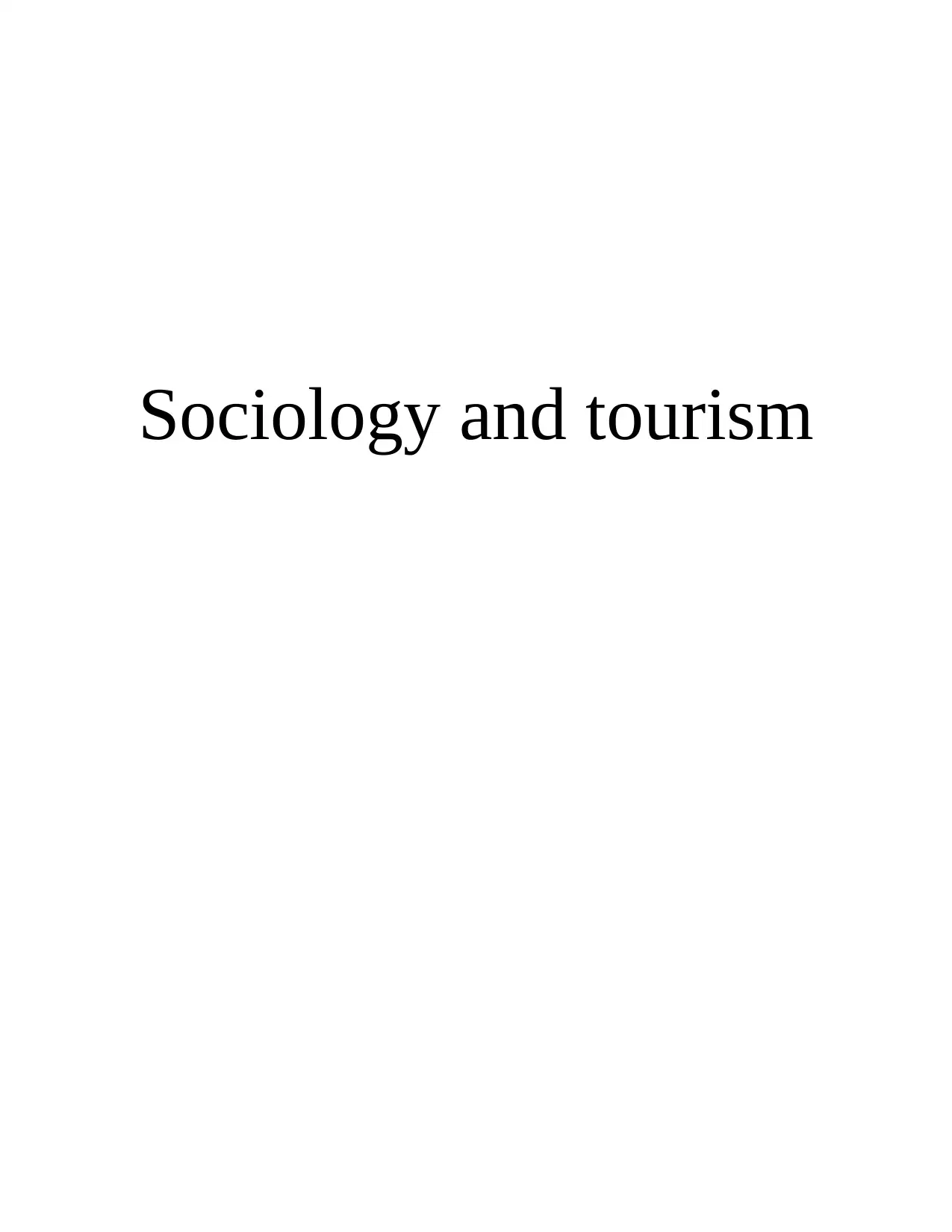
Sociology and tourism
Secure Best Marks with AI Grader
Need help grading? Try our AI Grader for instant feedback on your assignments.
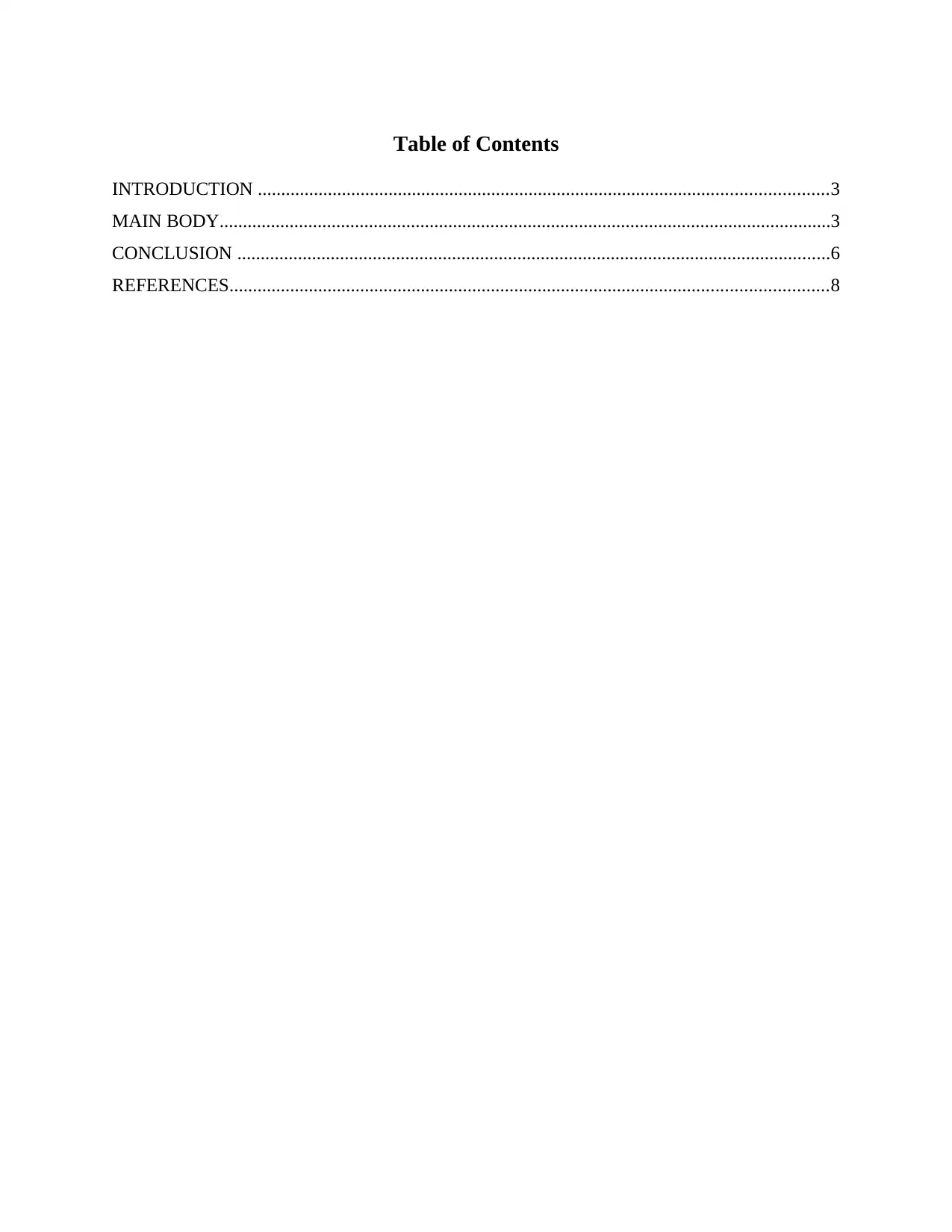
Table of Contents
INTRODUCTION ..........................................................................................................................3
MAIN BODY...................................................................................................................................3
CONCLUSION ...............................................................................................................................6
REFERENCES................................................................................................................................8
INTRODUCTION ..........................................................................................................................3
MAIN BODY...................................................................................................................................3
CONCLUSION ...............................................................................................................................6
REFERENCES................................................................................................................................8
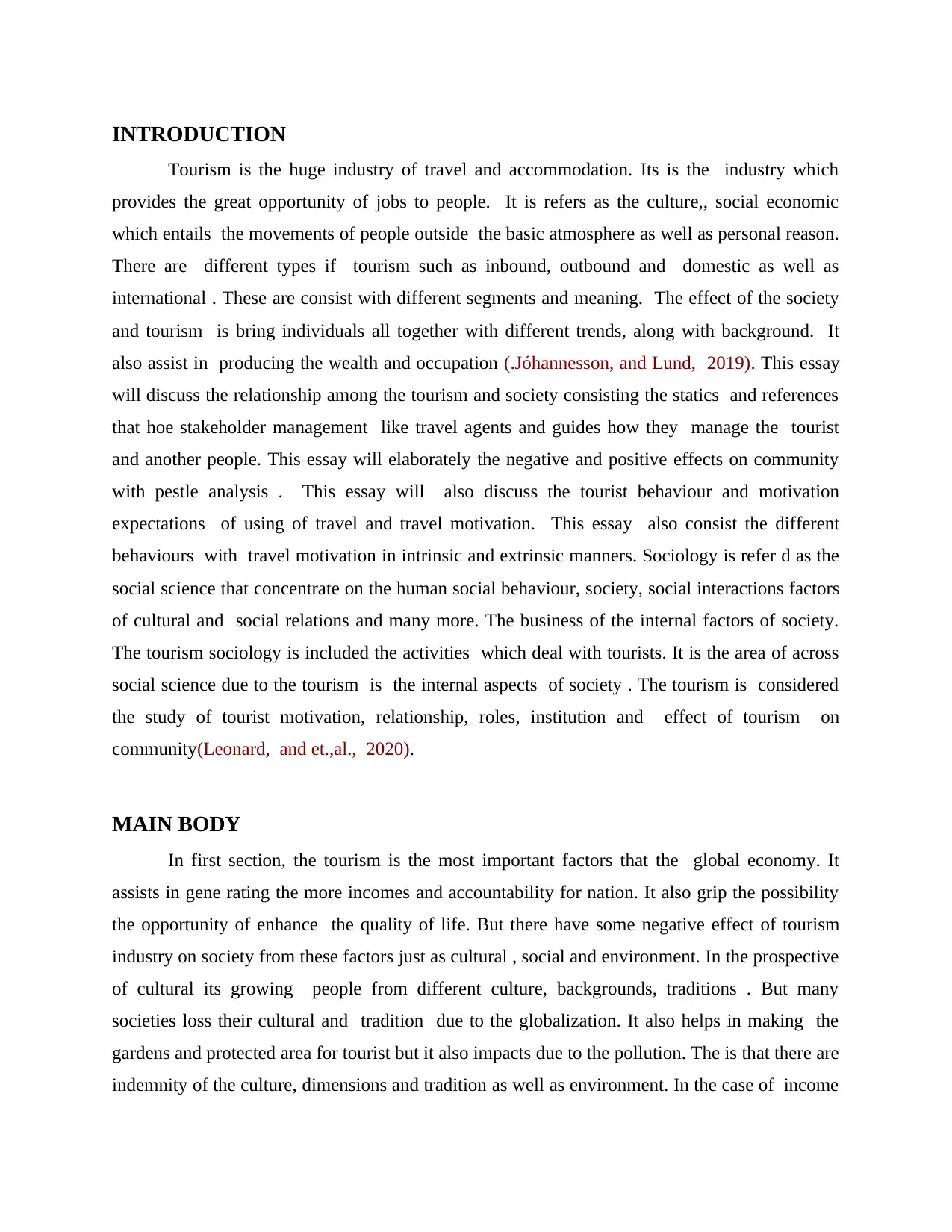
INTRODUCTION
Tourism is the huge industry of travel and accommodation. Its is the industry which
provides the great opportunity of jobs to people. It is refers as the culture,, social economic
which entails the movements of people outside the basic atmosphere as well as personal reason.
There are different types if tourism such as inbound, outbound and domestic as well as
international . These are consist with different segments and meaning. The effect of the society
and tourism is bring individuals all together with different trends, along with background. It
also assist in producing the wealth and occupation (.Jóhannesson, and Lund, 2019). This essay
will discuss the relationship among the tourism and society consisting the statics and references
that hoe stakeholder management like travel agents and guides how they manage the tourist
and another people. This essay will elaborately the negative and positive effects on community
with pestle analysis . This essay will also discuss the tourist behaviour and motivation
expectations of using of travel and travel motivation. This essay also consist the different
behaviours with travel motivation in intrinsic and extrinsic manners. Sociology is refer d as the
social science that concentrate on the human social behaviour, society, social interactions factors
of cultural and social relations and many more. The business of the internal factors of society.
The tourism sociology is included the activities which deal with tourists. It is the area of across
social science due to the tourism is the internal aspects of society . The tourism is considered
the study of tourist motivation, relationship, roles, institution and effect of tourism on
community(Leonard, and et.,al., 2020).
MAIN BODY
In first section, the tourism is the most important factors that the global economy. It
assists in gene rating the more incomes and accountability for nation. It also grip the possibility
the opportunity of enhance the quality of life. But there have some negative effect of tourism
industry on society from these factors just as cultural , social and environment. In the prospective
of cultural its growing people from different culture, backgrounds, traditions . But many
societies loss their cultural and tradition due to the globalization. It also helps in making the
gardens and protected area for tourist but it also impacts due to the pollution. The is that there are
indemnity of the culture, dimensions and tradition as well as environment. In the case of income
Tourism is the huge industry of travel and accommodation. Its is the industry which
provides the great opportunity of jobs to people. It is refers as the culture,, social economic
which entails the movements of people outside the basic atmosphere as well as personal reason.
There are different types if tourism such as inbound, outbound and domestic as well as
international . These are consist with different segments and meaning. The effect of the society
and tourism is bring individuals all together with different trends, along with background. It
also assist in producing the wealth and occupation (.Jóhannesson, and Lund, 2019). This essay
will discuss the relationship among the tourism and society consisting the statics and references
that hoe stakeholder management like travel agents and guides how they manage the tourist
and another people. This essay will elaborately the negative and positive effects on community
with pestle analysis . This essay will also discuss the tourist behaviour and motivation
expectations of using of travel and travel motivation. This essay also consist the different
behaviours with travel motivation in intrinsic and extrinsic manners. Sociology is refer d as the
social science that concentrate on the human social behaviour, society, social interactions factors
of cultural and social relations and many more. The business of the internal factors of society.
The tourism sociology is included the activities which deal with tourists. It is the area of across
social science due to the tourism is the internal aspects of society . The tourism is considered
the study of tourist motivation, relationship, roles, institution and effect of tourism on
community(Leonard, and et.,al., 2020).
MAIN BODY
In first section, the tourism is the most important factors that the global economy. It
assists in gene rating the more incomes and accountability for nation. It also grip the possibility
the opportunity of enhance the quality of life. But there have some negative effect of tourism
industry on society from these factors just as cultural , social and environment. In the prospective
of cultural its growing people from different culture, backgrounds, traditions . But many
societies loss their cultural and tradition due to the globalization. It also helps in making the
gardens and protected area for tourist but it also impacts due to the pollution. The is that there are
indemnity of the culture, dimensions and tradition as well as environment. In the case of income
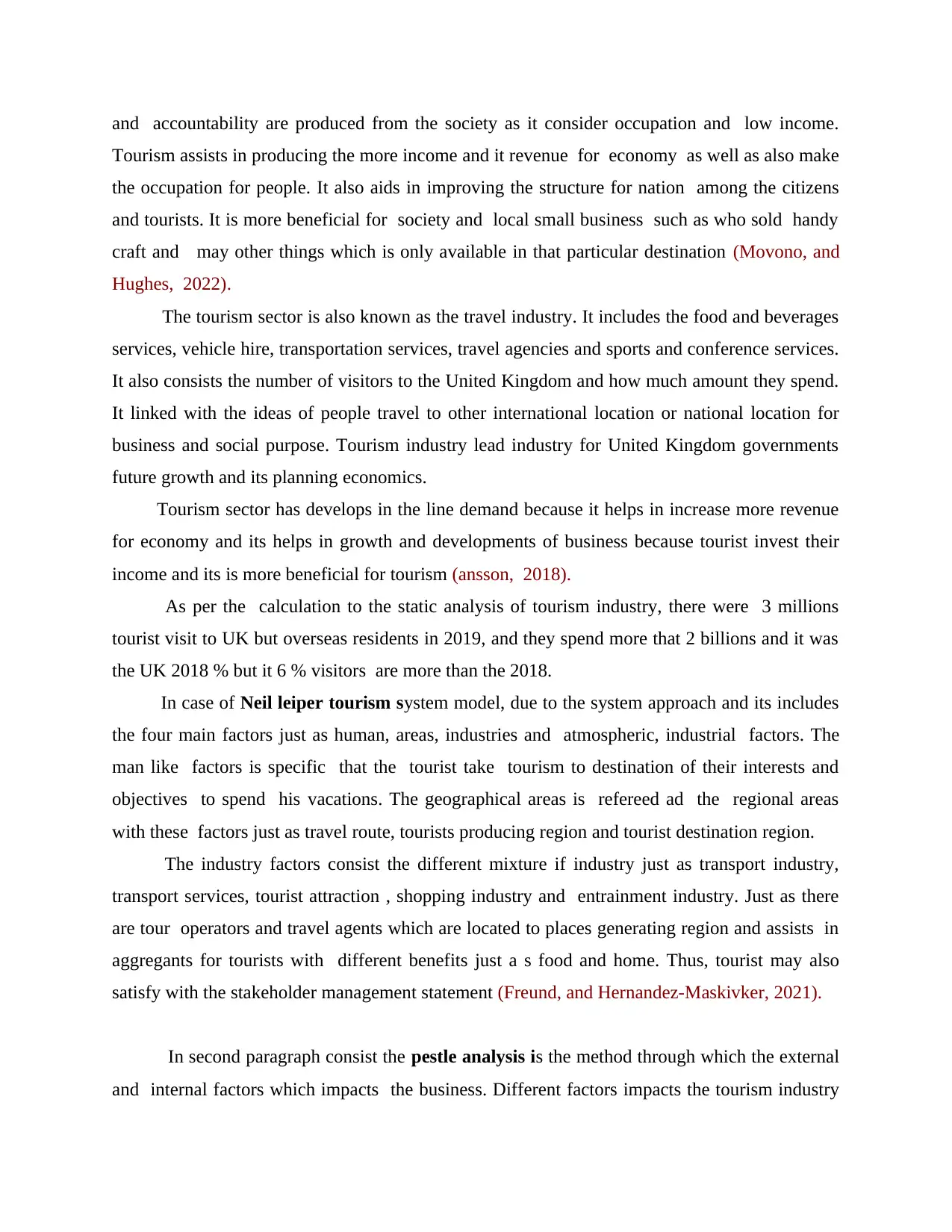
and accountability are produced from the society as it consider occupation and low income.
Tourism assists in producing the more income and it revenue for economy as well as also make
the occupation for people. It also aids in improving the structure for nation among the citizens
and tourists. It is more beneficial for society and local small business such as who sold handy
craft and may other things which is only available in that particular destination (Movono, and
Hughes, 2022).
The tourism sector is also known as the travel industry. It includes the food and beverages
services, vehicle hire, transportation services, travel agencies and sports and conference services.
It also consists the number of visitors to the United Kingdom and how much amount they spend.
It linked with the ideas of people travel to other international location or national location for
business and social purpose. Tourism industry lead industry for United Kingdom governments
future growth and its planning economics.
Tourism sector has develops in the line demand because it helps in increase more revenue
for economy and its helps in growth and developments of business because tourist invest their
income and its is more beneficial for tourism (ansson, 2018).
As per the calculation to the static analysis of tourism industry, there were 3 millions
tourist visit to UK but overseas residents in 2019, and they spend more that 2 billions and it was
the UK 2018 % but it 6 % visitors are more than the 2018.
In case of Neil leiper tourism system model, due to the system approach and its includes
the four main factors just as human, areas, industries and atmospheric, industrial factors. The
man like factors is specific that the tourist take tourism to destination of their interests and
objectives to spend his vacations. The geographical areas is refereed ad the regional areas
with these factors just as travel route, tourists producing region and tourist destination region.
The industry factors consist the different mixture if industry just as transport industry,
transport services, tourist attraction , shopping industry and entrainment industry. Just as there
are tour operators and travel agents which are located to places generating region and assists in
aggregants for tourists with different benefits just a s food and home. Thus, tourist may also
satisfy with the stakeholder management statement (Freund, and Hernandez-Maskivker, 2021).
In second paragraph consist the pestle analysis is the method through which the external
and internal factors which impacts the business. Different factors impacts the tourism industry
Tourism assists in producing the more income and it revenue for economy as well as also make
the occupation for people. It also aids in improving the structure for nation among the citizens
and tourists. It is more beneficial for society and local small business such as who sold handy
craft and may other things which is only available in that particular destination (Movono, and
Hughes, 2022).
The tourism sector is also known as the travel industry. It includes the food and beverages
services, vehicle hire, transportation services, travel agencies and sports and conference services.
It also consists the number of visitors to the United Kingdom and how much amount they spend.
It linked with the ideas of people travel to other international location or national location for
business and social purpose. Tourism industry lead industry for United Kingdom governments
future growth and its planning economics.
Tourism sector has develops in the line demand because it helps in increase more revenue
for economy and its helps in growth and developments of business because tourist invest their
income and its is more beneficial for tourism (ansson, 2018).
As per the calculation to the static analysis of tourism industry, there were 3 millions
tourist visit to UK but overseas residents in 2019, and they spend more that 2 billions and it was
the UK 2018 % but it 6 % visitors are more than the 2018.
In case of Neil leiper tourism system model, due to the system approach and its includes
the four main factors just as human, areas, industries and atmospheric, industrial factors. The
man like factors is specific that the tourist take tourism to destination of their interests and
objectives to spend his vacations. The geographical areas is refereed ad the regional areas
with these factors just as travel route, tourists producing region and tourist destination region.
The industry factors consist the different mixture if industry just as transport industry,
transport services, tourist attraction , shopping industry and entrainment industry. Just as there
are tour operators and travel agents which are located to places generating region and assists in
aggregants for tourists with different benefits just a s food and home. Thus, tourist may also
satisfy with the stakeholder management statement (Freund, and Hernandez-Maskivker, 2021).
In second paragraph consist the pestle analysis is the method through which the external
and internal factors which impacts the business. Different factors impacts the tourism industry
Secure Best Marks with AI Grader
Need help grading? Try our AI Grader for instant feedback on your assignments.
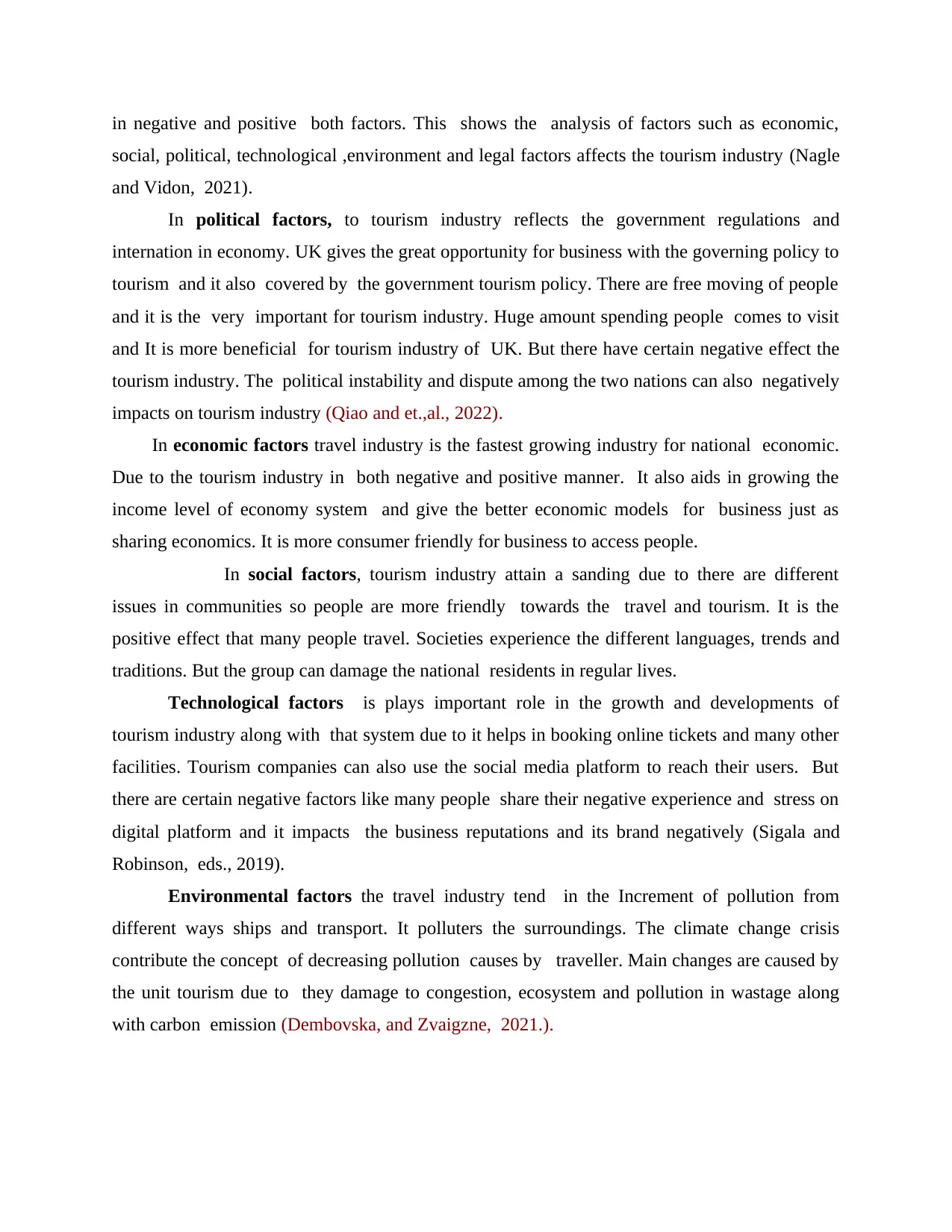
in negative and positive both factors. This shows the analysis of factors such as economic,
social, political, technological ,environment and legal factors affects the tourism industry (Nagle
and Vidon, 2021).
In political factors, to tourism industry reflects the government regulations and
internation in economy. UK gives the great opportunity for business with the governing policy to
tourism and it also covered by the government tourism policy. There are free moving of people
and it is the very important for tourism industry. Huge amount spending people comes to visit
and It is more beneficial for tourism industry of UK. But there have certain negative effect the
tourism industry. The political instability and dispute among the two nations can also negatively
impacts on tourism industry (Qiao and et.,al., 2022).
In economic factors travel industry is the fastest growing industry for national economic.
Due to the tourism industry in both negative and positive manner. It also aids in growing the
income level of economy system and give the better economic models for business just as
sharing economics. It is more consumer friendly for business to access people.
In social factors, tourism industry attain a sanding due to there are different
issues in communities so people are more friendly towards the travel and tourism. It is the
positive effect that many people travel. Societies experience the different languages, trends and
traditions. But the group can damage the national residents in regular lives.
Technological factors is plays important role in the growth and developments of
tourism industry along with that system due to it helps in booking online tickets and many other
facilities. Tourism companies can also use the social media platform to reach their users. But
there are certain negative factors like many people share their negative experience and stress on
digital platform and it impacts the business reputations and its brand negatively (Sigala and
Robinson, eds., 2019).
Environmental factors the travel industry tend in the Increment of pollution from
different ways ships and transport. It polluters the surroundings. The climate change crisis
contribute the concept of decreasing pollution causes by traveller. Main changes are caused by
the unit tourism due to they damage to congestion, ecosystem and pollution in wastage along
with carbon emission (Dembovska, and Zvaigzne, 2021.).
social, political, technological ,environment and legal factors affects the tourism industry (Nagle
and Vidon, 2021).
In political factors, to tourism industry reflects the government regulations and
internation in economy. UK gives the great opportunity for business with the governing policy to
tourism and it also covered by the government tourism policy. There are free moving of people
and it is the very important for tourism industry. Huge amount spending people comes to visit
and It is more beneficial for tourism industry of UK. But there have certain negative effect the
tourism industry. The political instability and dispute among the two nations can also negatively
impacts on tourism industry (Qiao and et.,al., 2022).
In economic factors travel industry is the fastest growing industry for national economic.
Due to the tourism industry in both negative and positive manner. It also aids in growing the
income level of economy system and give the better economic models for business just as
sharing economics. It is more consumer friendly for business to access people.
In social factors, tourism industry attain a sanding due to there are different
issues in communities so people are more friendly towards the travel and tourism. It is the
positive effect that many people travel. Societies experience the different languages, trends and
traditions. But the group can damage the national residents in regular lives.
Technological factors is plays important role in the growth and developments of
tourism industry along with that system due to it helps in booking online tickets and many other
facilities. Tourism companies can also use the social media platform to reach their users. But
there are certain negative factors like many people share their negative experience and stress on
digital platform and it impacts the business reputations and its brand negatively (Sigala and
Robinson, eds., 2019).
Environmental factors the travel industry tend in the Increment of pollution from
different ways ships and transport. It polluters the surroundings. The climate change crisis
contribute the concept of decreasing pollution causes by traveller. Main changes are caused by
the unit tourism due to they damage to congestion, ecosystem and pollution in wastage along
with carbon emission (Dembovska, and Zvaigzne, 2021.).
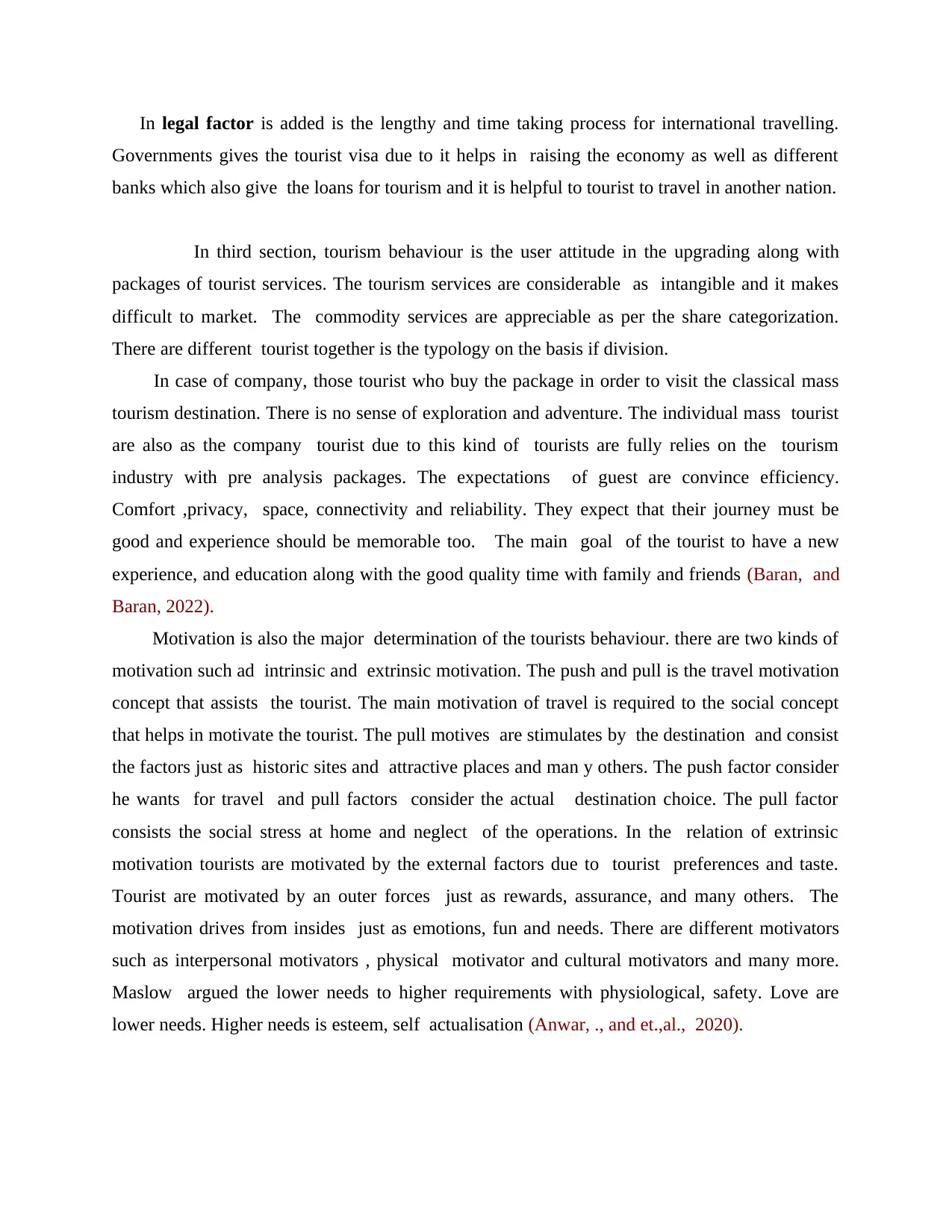
In legal factor is added is the lengthy and time taking process for international travelling.
Governments gives the tourist visa due to it helps in raising the economy as well as different
banks which also give the loans for tourism and it is helpful to tourist to travel in another nation.
In third section, tourism behaviour is the user attitude in the upgrading along with
packages of tourist services. The tourism services are considerable as intangible and it makes
difficult to market. The commodity services are appreciable as per the share categorization.
There are different tourist together is the typology on the basis if division.
In case of company, those tourist who buy the package in order to visit the classical mass
tourism destination. There is no sense of exploration and adventure. The individual mass tourist
are also as the company tourist due to this kind of tourists are fully relies on the tourism
industry with pre analysis packages. The expectations of guest are convince efficiency.
Comfort ,privacy, space, connectivity and reliability. They expect that their journey must be
good and experience should be memorable too. The main goal of the tourist to have a new
experience, and education along with the good quality time with family and friends (Baran, and
Baran, 2022).
Motivation is also the major determination of the tourists behaviour. there are two kinds of
motivation such ad intrinsic and extrinsic motivation. The push and pull is the travel motivation
concept that assists the tourist. The main motivation of travel is required to the social concept
that helps in motivate the tourist. The pull motives are stimulates by the destination and consist
the factors just as historic sites and attractive places and man y others. The push factor consider
he wants for travel and pull factors consider the actual destination choice. The pull factor
consists the social stress at home and neglect of the operations. In the relation of extrinsic
motivation tourists are motivated by the external factors due to tourist preferences and taste.
Tourist are motivated by an outer forces just as rewards, assurance, and many others. The
motivation drives from insides just as emotions, fun and needs. There are different motivators
such as interpersonal motivators , physical motivator and cultural motivators and many more.
Maslow argued the lower needs to higher requirements with physiological, safety. Love are
lower needs. Higher needs is esteem, self actualisation (Anwar, ., and et.,al., 2020).
Governments gives the tourist visa due to it helps in raising the economy as well as different
banks which also give the loans for tourism and it is helpful to tourist to travel in another nation.
In third section, tourism behaviour is the user attitude in the upgrading along with
packages of tourist services. The tourism services are considerable as intangible and it makes
difficult to market. The commodity services are appreciable as per the share categorization.
There are different tourist together is the typology on the basis if division.
In case of company, those tourist who buy the package in order to visit the classical mass
tourism destination. There is no sense of exploration and adventure. The individual mass tourist
are also as the company tourist due to this kind of tourists are fully relies on the tourism
industry with pre analysis packages. The expectations of guest are convince efficiency.
Comfort ,privacy, space, connectivity and reliability. They expect that their journey must be
good and experience should be memorable too. The main goal of the tourist to have a new
experience, and education along with the good quality time with family and friends (Baran, and
Baran, 2022).
Motivation is also the major determination of the tourists behaviour. there are two kinds of
motivation such ad intrinsic and extrinsic motivation. The push and pull is the travel motivation
concept that assists the tourist. The main motivation of travel is required to the social concept
that helps in motivate the tourist. The pull motives are stimulates by the destination and consist
the factors just as historic sites and attractive places and man y others. The push factor consider
he wants for travel and pull factors consider the actual destination choice. The pull factor
consists the social stress at home and neglect of the operations. In the relation of extrinsic
motivation tourists are motivated by the external factors due to tourist preferences and taste.
Tourist are motivated by an outer forces just as rewards, assurance, and many others. The
motivation drives from insides just as emotions, fun and needs. There are different motivators
such as interpersonal motivators , physical motivator and cultural motivators and many more.
Maslow argued the lower needs to higher requirements with physiological, safety. Love are
lower needs. Higher needs is esteem, self actualisation (Anwar, ., and et.,al., 2020).
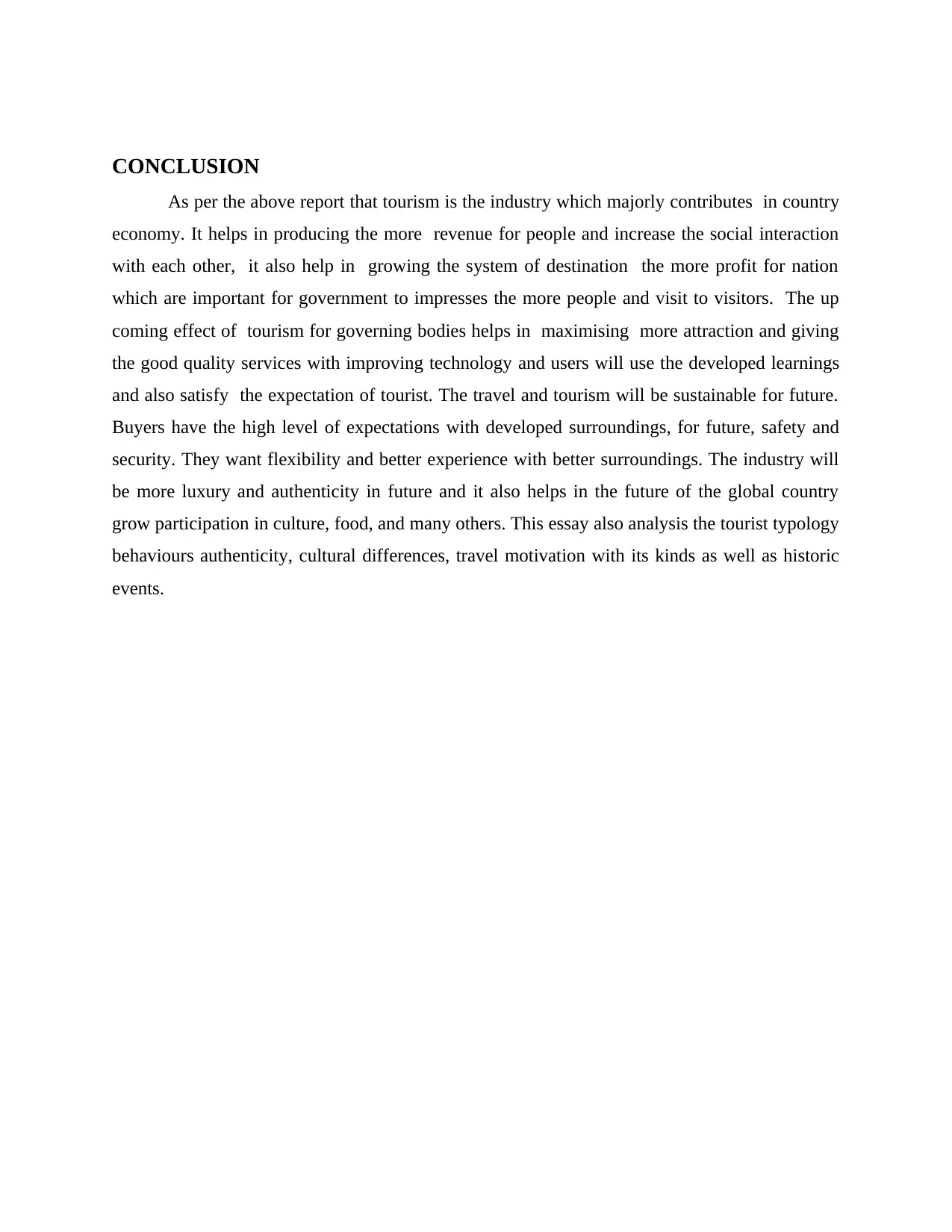
CONCLUSION
As per the above report that tourism is the industry which majorly contributes in country
economy. It helps in producing the more revenue for people and increase the social interaction
with each other, it also help in growing the system of destination the more profit for nation
which are important for government to impresses the more people and visit to visitors. The up
coming effect of tourism for governing bodies helps in maximising more attraction and giving
the good quality services with improving technology and users will use the developed learnings
and also satisfy the expectation of tourist. The travel and tourism will be sustainable for future.
Buyers have the high level of expectations with developed surroundings, for future, safety and
security. They want flexibility and better experience with better surroundings. The industry will
be more luxury and authenticity in future and it also helps in the future of the global country
grow participation in culture, food, and many others. This essay also analysis the tourist typology
behaviours authenticity, cultural differences, travel motivation with its kinds as well as historic
events.
As per the above report that tourism is the industry which majorly contributes in country
economy. It helps in producing the more revenue for people and increase the social interaction
with each other, it also help in growing the system of destination the more profit for nation
which are important for government to impresses the more people and visit to visitors. The up
coming effect of tourism for governing bodies helps in maximising more attraction and giving
the good quality services with improving technology and users will use the developed learnings
and also satisfy the expectation of tourist. The travel and tourism will be sustainable for future.
Buyers have the high level of expectations with developed surroundings, for future, safety and
security. They want flexibility and better experience with better surroundings. The industry will
be more luxury and authenticity in future and it also helps in the future of the global country
grow participation in culture, food, and many others. This essay also analysis the tourist typology
behaviours authenticity, cultural differences, travel motivation with its kinds as well as historic
events.
Paraphrase This Document
Need a fresh take? Get an instant paraphrase of this document with our AI Paraphraser
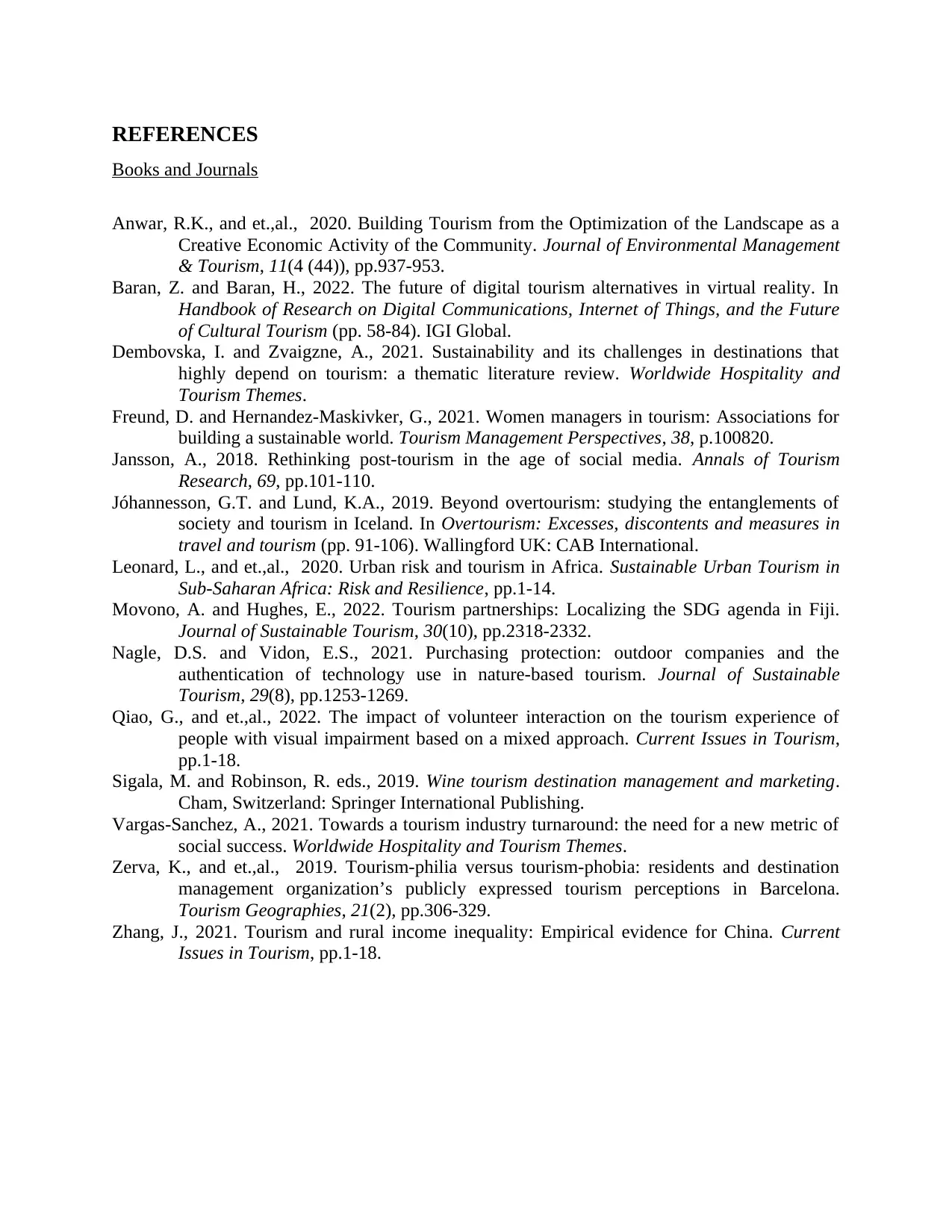
REFERENCES
Books and Journals
Anwar, R.K., and et.,al., 2020. Building Tourism from the Optimization of the Landscape as a
Creative Economic Activity of the Community. Journal of Environmental Management
& Tourism, 11(4 (44)), pp.937-953.
Baran, Z. and Baran, H., 2022. The future of digital tourism alternatives in virtual reality. In
Handbook of Research on Digital Communications, Internet of Things, and the Future
of Cultural Tourism (pp. 58-84). IGI Global.
Dembovska, I. and Zvaigzne, A., 2021. Sustainability and its challenges in destinations that
highly depend on tourism: a thematic literature review. Worldwide Hospitality and
Tourism Themes.
Freund, D. and Hernandez-Maskivker, G., 2021. Women managers in tourism: Associations for
building a sustainable world. Tourism Management Perspectives, 38, p.100820.
Jansson, A., 2018. Rethinking post-tourism in the age of social media. Annals of Tourism
Research, 69, pp.101-110.
Jóhannesson, G.T. and Lund, K.A., 2019. Beyond overtourism: studying the entanglements of
society and tourism in Iceland. In Overtourism: Excesses, discontents and measures in
travel and tourism (pp. 91-106). Wallingford UK: CAB International.
Leonard, L., and et.,al., 2020. Urban risk and tourism in Africa. Sustainable Urban Tourism in
Sub-Saharan Africa: Risk and Resilience, pp.1-14.
Movono, A. and Hughes, E., 2022. Tourism partnerships: Localizing the SDG agenda in Fiji.
Journal of Sustainable Tourism, 30(10), pp.2318-2332.
Nagle, D.S. and Vidon, E.S., 2021. Purchasing protection: outdoor companies and the
authentication of technology use in nature-based tourism. Journal of Sustainable
Tourism, 29(8), pp.1253-1269.
Qiao, G., and et.,al., 2022. The impact of volunteer interaction on the tourism experience of
people with visual impairment based on a mixed approach. Current Issues in Tourism,
pp.1-18.
Sigala, M. and Robinson, R. eds., 2019. Wine tourism destination management and marketing.
Cham, Switzerland: Springer International Publishing.
Vargas-Sanchez, A., 2021. Towards a tourism industry turnaround: the need for a new metric of
social success. Worldwide Hospitality and Tourism Themes.
Zerva, K., and et.,al., 2019. Tourism-philia versus tourism-phobia: residents and destination
management organization’s publicly expressed tourism perceptions in Barcelona.
Tourism Geographies, 21(2), pp.306-329.
Zhang, J., 2021. Tourism and rural income inequality: Empirical evidence for China. Current
Issues in Tourism, pp.1-18.
Books and Journals
Anwar, R.K., and et.,al., 2020. Building Tourism from the Optimization of the Landscape as a
Creative Economic Activity of the Community. Journal of Environmental Management
& Tourism, 11(4 (44)), pp.937-953.
Baran, Z. and Baran, H., 2022. The future of digital tourism alternatives in virtual reality. In
Handbook of Research on Digital Communications, Internet of Things, and the Future
of Cultural Tourism (pp. 58-84). IGI Global.
Dembovska, I. and Zvaigzne, A., 2021. Sustainability and its challenges in destinations that
highly depend on tourism: a thematic literature review. Worldwide Hospitality and
Tourism Themes.
Freund, D. and Hernandez-Maskivker, G., 2021. Women managers in tourism: Associations for
building a sustainable world. Tourism Management Perspectives, 38, p.100820.
Jansson, A., 2018. Rethinking post-tourism in the age of social media. Annals of Tourism
Research, 69, pp.101-110.
Jóhannesson, G.T. and Lund, K.A., 2019. Beyond overtourism: studying the entanglements of
society and tourism in Iceland. In Overtourism: Excesses, discontents and measures in
travel and tourism (pp. 91-106). Wallingford UK: CAB International.
Leonard, L., and et.,al., 2020. Urban risk and tourism in Africa. Sustainable Urban Tourism in
Sub-Saharan Africa: Risk and Resilience, pp.1-14.
Movono, A. and Hughes, E., 2022. Tourism partnerships: Localizing the SDG agenda in Fiji.
Journal of Sustainable Tourism, 30(10), pp.2318-2332.
Nagle, D.S. and Vidon, E.S., 2021. Purchasing protection: outdoor companies and the
authentication of technology use in nature-based tourism. Journal of Sustainable
Tourism, 29(8), pp.1253-1269.
Qiao, G., and et.,al., 2022. The impact of volunteer interaction on the tourism experience of
people with visual impairment based on a mixed approach. Current Issues in Tourism,
pp.1-18.
Sigala, M. and Robinson, R. eds., 2019. Wine tourism destination management and marketing.
Cham, Switzerland: Springer International Publishing.
Vargas-Sanchez, A., 2021. Towards a tourism industry turnaround: the need for a new metric of
social success. Worldwide Hospitality and Tourism Themes.
Zerva, K., and et.,al., 2019. Tourism-philia versus tourism-phobia: residents and destination
management organization’s publicly expressed tourism perceptions in Barcelona.
Tourism Geographies, 21(2), pp.306-329.
Zhang, J., 2021. Tourism and rural income inequality: Empirical evidence for China. Current
Issues in Tourism, pp.1-18.
1 out of 8
Related Documents
Your All-in-One AI-Powered Toolkit for Academic Success.
+13062052269
info@desklib.com
Available 24*7 on WhatsApp / Email
![[object Object]](/_next/static/media/star-bottom.7253800d.svg)
Unlock your academic potential
© 2024 | Zucol Services PVT LTD | All rights reserved.





